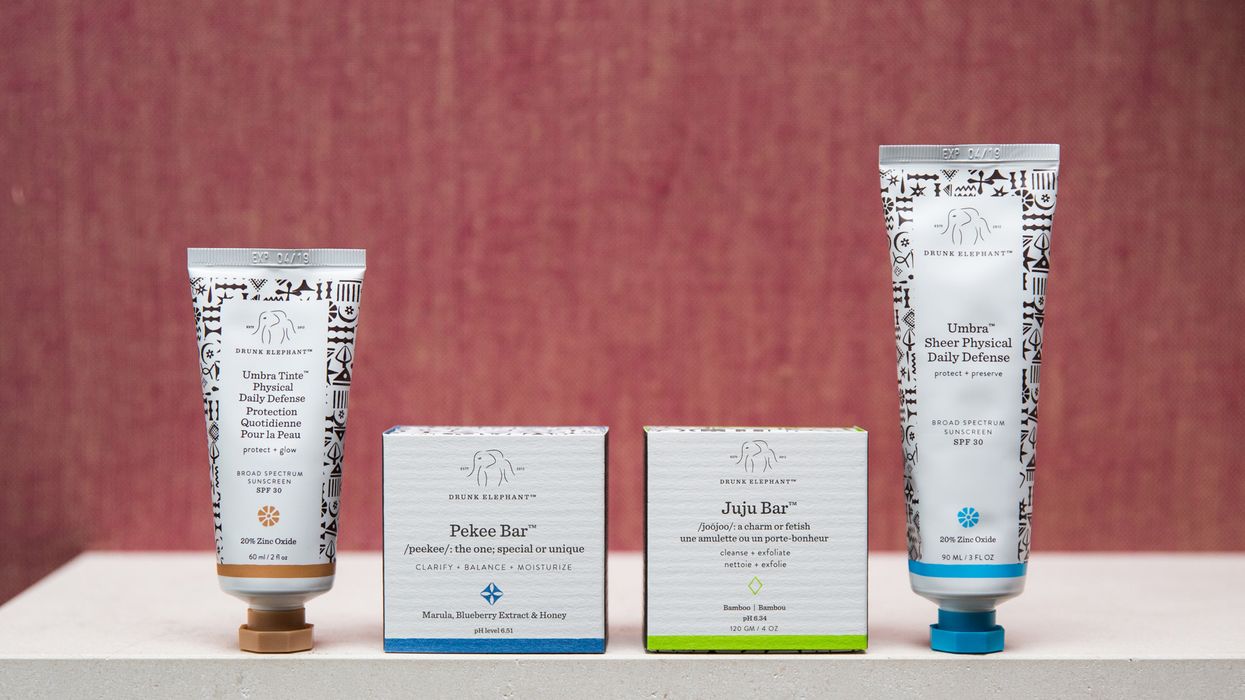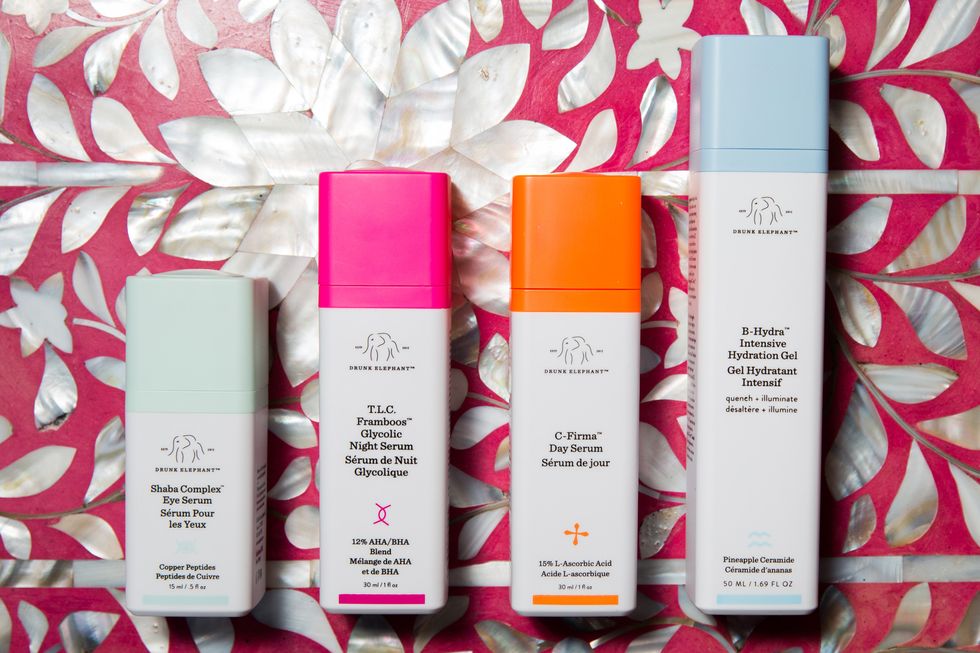The Non-Toxic Beauty Brand Sephora Can’t Keep On Its Shelves
Drunk Elephant’s founder on why there’s no such thing as a skin type, the six dirty ingredients in skin care, and why all-natural can be toxic for your skin, too.

Everyone is a skin-care junkie these days. Our feeds are flooded with a myriad of skin-care-obsessed content. From scientific-jargon-filled articles penned in glossies to the at-home confessionals of our friends and the influencers we follow, everyone is captivated by the path to healthy skin. Tiffany Masterson, founder of cult-favorite beauty brand Drunk Elephant, falls into that category—but in our eyes, times ten. Masterson, who was a stay-at-home mom from Houston, Texas, was moonlighting as a beauty pro—researching ingredients she often found in her own beauty products to find out what was causing her various skin ailments. After years of putting oils, food, et cetera on her face, interviewing dermatologists, and holding at-home focus groups with friends, Masterson launched her core six-product beauty brand—a natural-meets-clinical line of products stripped of six specific ingredients she had deemed the source of most skin irritations and disruption. “Clean-clinical,” as she describes it. Fast-forward to this past year, and Sephora can’t keep Masterson’s Drunk Elephant products on the shelves. We sat down to talk its meteoric success, why we should all forget about skin types, and why all-natural beauty can be toxic, too.
When her interest in skin care began:
“From a young age, I was interested in skin care. I can’t say that I ever thought I was going to have a career in skin care, but I remember using my mom’s stuff, and I would go to Sephora and buy all the things I thought looked good in the magazine. I thought my skin was sensitive, acne-prone, [and I had] a little bit of rosacea, so I can remember the times I would go to the dermatologist or [research] a new product that I hoped might work.
“When my fourth child started school, I started getting antsy. I sold Arbonne for a while, then eventually started selling this little bar cleanser on the side. It wasn’t anything I made or developed, it was just something that my brother and brother-in-law were importing. I became more interested in why some ingredients work and why some don’t. And this bar, in particular, didn't represent anything special except that when you used it, your skin would clear up. As a result, my skin calmed down, which was interesting to me. I would go use another product, and my skin would react again. It ignited a lot of real interest in ingredients—the roles ingredients play in skin care. Why are they there? What effect do they have on our skin? How does our skin function?”

How she turned an obsession into a brand:
“I was studying those ingredients and seeing common threads. I was obsessed. I was staying up to midnight really trying to learn. At some point, someone said, ‘You don’t own the bar that you’re selling. Why don’t you create your own line?’ I called my brother-in-law and said, ‘I feel like I could do this. I don’t want to do just a cleanser. Let’s do a whole line.’
“I decided to start a line and do a whole routine right out of the chute. I’m going to make these with high-level actives and as efficacious as any dermatologist brand because that’s what I wanted as the consumer. I wanted to be able to go to Sephora, which is where I would shop for my skin care, and be able to buy more a 15 percent vitamin C or a 12 percent glycolic that didn’t contain the marketing ingredients like most of them do.”
Why she doesn’t believe in skin types:
“I came to the conclusion that there weren’t skin types. Skin is skin. Your liver functions the same as my liver—if you drink too much and you have problems with your liver, it’s not because you have a sensitive liver. It’s because what you’re putting in your liver, your liver can’t process. Our skin all functions the same. It has an acid mantle that’s critical to its ability to thrive. That’s how it functions. If your skin is not functioning the way it should be and you have acne-prone or red or inflamed or combination or whatever you have...perhaps you’ve disrupted the acid mantle that allows skin to function. Or perhaps you have sensitized skin and don’t even know it. Your skin is the same as my skin. Most people out there actually have sensitized skin from the ingredients they are using every day, but they believe it’s ‘sensitive.’”
The six dirty ingredients:
“The six ingredients I had removed were basically marketing ingredients. Were they necessary for the formulation? Are they beneficial to the health of our skin? And are they supporting the integrity of the product? The answer was no in every case. Silicones are not there to help our skin be better; silicones are there to help the formulations feel better. Essential oils aren’t there to make our skin better; they are there to make a product smell pretty. Drying alcohol is there to impart a false sense of non-oily skin, but it actually leads to oily skin. Silicones, essential oils, fragrance, dyes—I literally can’t seem to find one reason to include them in skin care. They’re just marketing ingredients that happen to be bad for the health of our skin. Drying alcohol, SLS (sodium lauryl sulfate), and chemical screens—that’s what broke me out every time and sensitized my skin. Going with zinc over chemical screens and removing the other five was a no-brainer for me.”
There’s a difference between moisture and hydration:
“Dehydrated skin is lacking water. Dry skin lacks moisture. You can have dehydrated skin and mistake it for dry [skin] and load it up with oil-based moisture and silicones, but that’s not going to help the dehydrated part of it. In fact, silicones dehydrate skin. You could still have flaky skin; your skin could still be dull. And you’re going, ‘I’m using a ton of moisturizer, why?’ It’s because our skin needs both. I have a hydration serum and three moisturizers in my line. You can mix them together so it’s long-lasting, silicone-free moisture and hydration, making it easy to combat both issues.”

Her skin-care mind-set:
“I think of all of my products that I put on my face every day like a smoothie. I think of ingredients as food for my skin. I add water to my smoothie, protein, fat—I put coconut oil—antioxidants, greens, and collagen. It’s the same way with my skin routine. I put a pump of vitamin C, a pump of hydration—every time I put something on my face, a pump of my B-Hydra goes in to make sure that my skin stays hydrated—a pump of moisture, a pump of physical protection, and then at night, it’s just a pump of chemical exfoliation, some oil, a little bit of extra moisture if I need it and some hydration. It’s so quick, and it’s not overwhelming at all, which I think it could be when you’re headed toward 15 or 16 products.”
Don’t over-cleanse:
“I tell my customer to not cleanse in the morning. It’s not necessary. Your skin should have the acid mantle intact. In the morning, it should be balanced. Not oily. Not dry. It should be completely balanced. That’s been a gamechanger for so many people who are like, ‘Oh my god, my skin is totally different now that I’ve quit cleansing twice.’ You don’t need it.”
Biggest myth in skin care:
“That all-natural is all good. Drunk Elephant is confused for an all-natural all the time because I think people get the message quickly that this is a safe brand to use on your skin. It’s healthy, and so they equate that with all-natural immediately. Synthetics can be great, and they can be safe, and they can make a product really effective. There are safe synthetics, and there are bad synthetics. And there are safe naturals, and there are bad naturals. I absolutely think that essential oils are toxic for our skin. Our skin can’t process them the right way. I use safe synthetic and natural ingredients.”
What’s to come:
“I have another cleanser that’s coming later in the year. I think we’ll grow globally. The way I take care of my skin is just one aspect of my lifestyle. It’s just part of a whole health and wellness thing. Perhaps I’ll do body one day. Drunk Elephant is for men, women, young, and old—every skin out there. My goal is to create awareness and reach more people—to change the way people view skin care.”
Want more stories like this?
I Swear Eyelash Extensions Made Me Low-Maintenance
What Happens When You Cut Gluten, Dairy, and Alcohol for 21 Days?
The Weird Thing That Finally Fixed My Skin